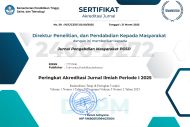Integrasi STEM dan SDGs: Praktik Baik Pelatihan Guru Biologi dalam Penyusunan Desain Pembelajaran Berbasis Keberlanjutan
Abstract
Keywords
Full Text:
PDFReferences
Almazroa, H., & Alotaibi, W. (2023). Teaching 21st century skills: Understanding the depth and width of the challenges to shape proactive teacher education programmes. Sustainability, 15(9), 7365. https://doi.org/10.3390/su15097365
Bascopé, M., Perasso, P., & Reiss, K. (2019). Systematic review of education for sustainable development at an early stage: Cornerstones and pedagogical approaches for teacher professional development. Sustainability, 11(3), 719. https://doi.org/10.3390/su11030719
Muthmainnah, R., & Putri, D. I. (2023). Teachers’ beliefs and efficacy of technological pedagogical content knowledge for STEM learning. Jurnal Bioterdidik: Wahana Ekspresi Ilmiah, 11(2), 152–161. https://doi.org/10.23960/jbt.v11.i2.28402
Cahyani, D. R., Ridha, M. L., Nabila, S., Supriyadi, S., & Izzatika, A. (2024). Perspektif guru terhadap implementasi pendidikan untuk pembangunan berkelanjutan (ESD) dalam mata pelajaran IPAS di kelas V sekolah dasar. NUSRA: Jurnal Penelitian dan Ilmu Pendidikan, 5(4), 1885–1891. https://doi.org/10.55681/nusra.v5i4.3525
Chai, C. S., & Koh, J. H. L. (2017). Changing teachers’ TPACK and design beliefs through the Scaffolded TPACK Lesson Design Model (STLDM). Learning: Research and Practice, 3(2), 114–129. https://doi.org/10.1080/23735082.2017.1360506
Cordaro, J. A., Murphy, C., & Redman, E. (2025). Bridging STEM education and sustainability: insights from Pennsylvania educators. Education Sciences, 15(3), 282. https://doi.org/10.3390/educsci15030282
Hadi, H. K., Wicaksono, V. D., Suryanto, M. H. S., Kautsar, A., & Wijaya, A. (2025). Pelatihan pembelajaran berbasis STEAM bagi guru Labschool UNPATTI. Abimanyu: Journal of Community Engagement, 6(1), 64–72. https://doi.org/10.26740/abi.v6n1.p64-72
Jackson, W. M., Binding, M. K., Grindstaff, K., Hariani, M., & Koo, B. W. (2023). Addressing sustainability in the high school biology classroom through socioscientific issues. Sustainability, 15(7), 5766. https://doi.org/10.3390/su15075766
Kurniasih, D., Kurniati, T., Baihaqie, A. G., & Oktaviyanti, E. (2024). Empowering educators through STEM and local wisdom-infused learning with lesson study at SMAIT Al-Fityan Kubu Raya. Community Empowerment, 9(3), 521–530. https://doi.org/10.31603/ce.11137
Limiansih, K., Sulistyani, N., & Melissa, M. M. (2024). Persepsi guru SMP terhadap literasi sains dan implikasinya pada pembelajaran sains di sekolah. Jurnal Pendidikan MIPA, 14(3), 786–796. https://doi.org/10.37630/jpm.v14i3.1858
Mabsutsah, N., & Yushardi, Y. (2022). Analisis kebutuhan guru terhadap e module berbasis steam dan kurikulum merdeka pada materi pemanasan global. Jurnal Pendidikan MIPA, 12(2), 205–213. https://doi.org/10.37630/jpm.v12i2.588
Maulina, D., Priadi, M. A., Gustina, M., & Rakhmawati, I. (2025). Improving student’s critical thinking skills and sustainability awareness using problem based learning model. Jurnal Pendidikan Sains Indonesia, 13(1), 178–188. https://doi.org/10.24815/jpsi.v13i1.42135
Milasari, D., & Nugraheni, N. (2024). Integrasi pendidikan konservasi dan teknologi untuk mewujudkan pendidikan inklusif dan berkualitas dalam pencapaian SDGs. Jurnal Penelitian Pendidikan Indonesia, 1(3), 119–125. https://doi.org/10.62017/jppi.v1i3.988
Puspitasari, E. (2025). SDGs-based adaptive curriculum model to improve education quality in the digital age. Inovasi Kurikulum, 22(1), 1–12. https://doi.org/10.17509/jik.v22i1.75791
Roehrig, G. H., Dare, E. A., Ellis, J. A., & Ring-Whalen, E. (2021). Beyond the basics: A detailed conceptual framework of integrated STEM. Disciplinary and Interdisciplinary Science Education Research, 3(1), 11. https://doi.org/10.1186/s43031-021-00041-y
Sanchez, S.-J., Guzman, Y. P., Sosa-Molano, J., Robertson, D., Ahern, S., & Garza, T. (2025). Systematic literature review: A typology of sustainability literacy and environmental literacy. Frontiers in Education, 10, 1490791. https://doi.org/10.3389/feduc.2025.1490791
Usman, G. B. T., Ali, M. N., & Ahmad, M. Z. (2023). Effectiveness of STEM problem-based learning on the achievement of biology among secondary school students in Nigeria. Journal of Turkish Science Education, 20(3), 453–467. https://doi.org/10.36681/tused.2023.026
Wandari, W., Nursamsu, N., & Wahyuni, A. (2024). Peningkatan kemampuan berpikir kritis siswa biologi dengan menggunakan model PjBL berbasis STEM (Science, Technology, Engineering, Mathematics). BIODIK, 10(4), 743–754. https://doi.org/10.22437/biodik.v10i4.38431
DOI: https://doi.org/10.17509/jpm.v5i2.89725
Refbacks
- There are currently no refbacks.
Copyright (c) 2025 Universitas Pendidikan Indonesia

This work is licensed under a Creative Commons Attribution 4.0 International License.

Jurnal Pengabdian Masyarakat PGSD is licensed under a Creative Commons Attribution 4.0 International License.
This journal is indexed by

.png)



1.png)

1.png)


1.png)